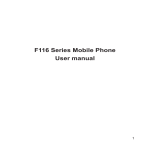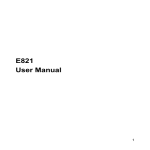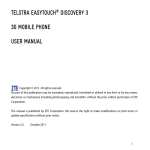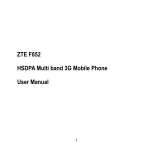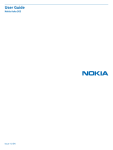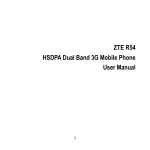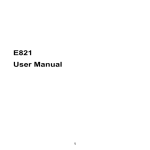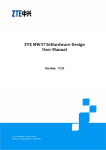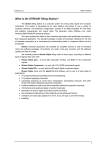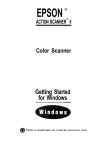Download User Manual
Transcript
T203 Mobile Phone User Manual 1 LEGAL INFORMATION Copyright © 2011 ZTE CORPORATION. All rights reserved. No part of this publication may be excerpted, reproduced, translated or utilized in any form or by any means, electronic or mechanical, including photocopying and microfilm, without the prior written permission of ZTE Corporation. The manual is published by ZTE Corporation. We reserve the right to make modifications on print errors or update specifications without prior notice. Version No. : R1.1 Edition Time: July. 2011 Manual No. : 079584503385 2 Contents Safety Information.................................................. 6 General Care.............................................................................. 6 General Guidelines..................................................................... 9 Road Safety.............................................................................. 10 Hospital Safety..........................................................................11 Emergency Service...................................................................11 Third Party Equipment.............................................................. 12 Vehicles Equipped with an Airbag............................................ 12 Aircraft Safety........................................................................... 13 Declaration of Conformity......................................................... 13 Copyright Notice....................................................................... 13 Radio Frequency (RF) Energy.................................................. 14 FCC Compliance...................................................................... 15 Disposing of Your Phone.......................................................... 16 Limitation of Liability........................................... 18 Your Phone............................................................ 19 Overview................................................................................... 19 Keys and Functions.................................................................. 20 Starting Up............................................................ 22 Open the Back Cover............................................................... 22 Installing the Battery................................................................. 22 Installing the (U)SIM Card........................................................ 23 Charging................................................................................... 24 3 Security Code........................................................................... 25 Handset Code..................................................................... 25 PIN Code............................................................................ 26 PUK Code........................................................................... 27 Basic...................................................................... 28 Power On/Off............................................................................ 28 Standby Mode.......................................................................... 28 Indicators and Icons................................................................. 29 Main Menu................................................................................ 29 Keypad Lock............................................................................. 31 Making Calls............................................................................. 32 Receiving Calls......................................................................... 33 Options for Voice Call......................................................... 33 Call History............................................................................... 33 Text Input............................................................... 34 Contacts................................................................ 35 Adding Contact......................................................................... 35 Searching Contact.................................................................... 35 Setting Speed Dial.................................................................... 36 Making a Speed Dial........................................................... 36 Other Options........................................................................... 37 Message................................................................ 38 Sending SMS............................................................................ 38 Message Settings..................................................................... 38 4 Broadcast.............................................................. 40 New Message Broadcasting . .................................................. 40 Inbox Message Broadcasting .................................................. 40 Incoming Call Broadcasting . ................................................... 41 Standby Call Broadcasting ...................................................... 41 Broadcast Settings .................................................................. 42 Torch Switch......................................................... 42 Keylock Switch .................................................... 43 FM Radio............................................................... 43 Other Facilities..................................................... 44 Alarm........................................................................................ 44 Calendar................................................................................... 44 Calculator................................................................................. 44 Settings................................................................. 45 Profiles...................................................................................... 45 Handset.................................................................................... 45 Call........................................................................................... 46 Network Setting........................................................................ 48 Security..................................................................................... 48 Switch Settings......................................................................... 50 Troubleshooting and FAQs.................................. 51 Technical Parameters........................................... 56 5 Chapter 1 Safety Information General Care Your handset contains delicate electronic circuitry, magnets and battery systems. You should treat it with care and give particular attention to the following points: • Do not allow the handset, battery or accessories to come into contact with liquids or moisture at any time. Do not immerse the handset in any liquid. • Do not place the handset alongside computer disks, credit cards, travel cards and other magnetic media. The information contained on disks or cards may be affected by the handset. • Do not place anything in the folded handset. • Do not paint the handset. • Do not leave the handset or the battery in places where the temperature could exceed 60 °C, e.g. on a car dashboard or a windowsill, behind glass in direct sunlight, etc. • Do not remove the handset’s battery while the handset is switched on. • Take care not to allow metal objects, such as coins or key rings to contact or short-circuit the battery terminals. • Do not dispose of battery packs in a fire. The handset’s Li-ION batteries may be safely disposed of at a Li-ION recycling point. • Do not put the handset’s battery in your mouth, as battery 6 electrolytes may be toxic if swallowed. • Do not attempt to dismantle the handset or any of its accessories. • This equipment is fitted with an internal battery; take it to a qualified service engineer when the replacement of the battery is required. • There is a risk of explosion if the battery is replaced with an incorrect battery type. Dispose of the used battery in accordance with the manufacturer’s instructions. • Do not put a battery into a microwave oven, dryer, or highpressure container. • Do not contact battery directly to an electric outlet or cigarette lighter charger. Use only approved charger units. • Do not pierce battery with a sharp object such as a needle. • When the battery is thrown away, be sure it is non-conducting by applying vinyl tape to the (+) and (-) terminals. • Do not disassemble or modify the battery. • Do not drop, throw, or subject the handset to rough treatment. • Stop using the battery if abnormal heat, odor, discoloration, deformation, or abnormal condition is detected during use, charge, or storage. • In the unlikely event of a battery leak, keep the battery discharge away from your eyes or skin. If the leakage does come into contact with the eyes or skin, please flush thoroughly in clean water and consult with a doctor. • Do not use a damaged or deformed battery. 7 • Do not solder a battery directly. • Remove the battery whose life cycle has expired from equipment immediately. • The earpiece may become warm during normal use. Also, the handset itself may become warm while the battery is being charged. • When a handset is in vibration mode, the vibration can sometimes cause the handset to move. • Be careful not to place the handset near heat sources (such as a heater) or too close to the edge of the table. • Use a damp or anti-static cloth to clean the handset. Do not use an ordinary dry cloth or electrostatic cloth. Do not use chemical or abrasive cleaners as these could damage the casing. • Third party equipment: The use of third party equipment, cables or accessories, not made or authorized by manufacturer, may invalidate the warranty of your handset and also adversely affect the phone’s safety/operation. • Remember to make backup copies of all important data on your handset. • Remember to recycle: the cardboard packing supplied with this handset is ideal for recycling. Caution: Caution explosion if battery is replaced by an incorrect type. Dispose of used batteries according to the instructions. 8 General Guidelines • In some countries national law unapproved private copying of copyrighted material. Please check the national legislation of the applicable country concerning the use of such material. • Many jurisdictions have laws and regulations about taking pictures in public or private areas and regarding the processing and further use of such pictures. The manufacturer encourages its customers to obey all laws and to respect the personal rights of others. • Please check roaming agreement availability with your service provider. • The use of mobile phones is not allowed in some radiation sensitive areas, such as hospitals, research centers and airplanes. The user is responsible to power-off the device. If there is any uncertainty, you should remove the battery from the handset. • Observe any signs that indicate powering off your handsets, such as those near gas stations, or explosives and power off the handset/device immediately. • If you have a heart condition, be careful with the settings of call vibration or tone volume. • Do not allow children to play with the handset, charger or batteries. • Do not use the handset where blasting is in progress. • Do not try to make a call or conversation while the temperature of charging battery is above 50°C. 9 • Take care not to put your handset in the back pocket of your trousers or skirt and then sit on it. Also, do not put your phone at the bottom of bag where it may subject to excessive weight or pressure. Doing so may damage the LCD and camera lens and cause them malfunction. • The operation of some medical electronic devices, such as hearing aids and pacemakers, may be affected if a handset is used next to them. Observe any caution signs and the manufacturer’s recommendations. • Do not leave the handset discharged or without a battery for a long time, otherwise some data may be erased. • Your phone contains metal, which may cause you an itch, a rash or eczema depending on your physical condition. Road Safety • You must exercise proper control of your vehicle at all times. Give your full attention to driving. • Observe all of the recommendations contained in your local traffic safety documentation. • Pull off the road and park before making or answering a call, if driving conditions require so. • Check if local laws and/or regulations restrict the use of handsets while driving. • You MUST NOT stop on the hard shoulder of a motorway to answer or make a call, except in an emergency. • Switch off your handset at a refueling point, such as a gas station, even if you are not refueling your own car. 10 • Do not store or carry flammable or explosive materials in the same compartment as the handset. • Electronic vehicle systems, such as anti-lock brakes, speed control and fuel injection systems are not normally affected by radio transmissions. The manufacturer of such equipment can advise if it is adequately shielded from radio transmissions. If you suspect vehicle problems caused by radio transmissions, consult your dealer and do not switch on the handset until it has been checked by qualified approved installers. Hospital Safety • Switch off your phone and remove the battery in areas where the use of handsets is prohibited. • Follow the instructions given by the respective medical facility regarding the use of handsets on their premises. Emergency Service Notes: Emergency service numbers vary by country. It helps you get emergency service from the operator. To make an emergency call in any country: 1. Ensure that your handset is on and in service. 2. Press the End Key as many times as needed to clear the display and ready the device for calls. 3. Enter the local emergency number for your current location, for example, 911. 11 4. Press the OK Key (Green key) to dial the number. Follow the instructions you receive and do not end the call until told to do so. When the (U)SIM card is not inserted or when the dial lock function is on, enter the official emergency number for your present location. Press the OK Key (Green key) to dial the number. Notes: Tell the operator which service you require: Police, Ambulance, Fire Brigade, Coastguard or Mountain Rescue Service. Tell them where you are and remain stationary to maintain contact if possible. Due to the nature of the cellular system, the connection of emergency calls cannot be guaranteed. You should never rely solely on any wireless device for essential communications like medical emergencies. Third Party Equipment The use of third party equipment, cables or accessories, not made or authorized by the manufacturer, may invalidate the warranty of your handset and also adversely affect the handset’s operation. For example, use only the manufacturer mains cable supplied with the AC charger. Vehicles Equipped with an Airbag An airbag inflates with great force. Do not place objects, including either installed or portable wireless equipment, in the area over the airbag or in the airbag deployment area. If in-vehicle wireless 12 equipment is improperly installed and the airbag inflates, serious injury could result. Aircraft Safety • Power off your phone before the airplane takes off. In order to protect airplane’s communication system from interference, it is prohibited to use mobile phone in flight. If you want to use mobile phone before the airplane takes off, you should get aircrew’s permission according to safety regulations. • If the mobile phone has the function of automatic timing poweron, please check your alarm setting to ensure that your phone will not be automatically powered on during the flight. Declaration of Conformity We declare under our sole responsibility that the product(s) detailed in this manual, and in combination with our accessories, conform to the essential requirements of European Union Directive 1999/5/ EC Radio and Telecommunications Terminal Equipment Directive requirements 3.1(a), 3.1(b), 3.2. Copyright Notice The video/audio recordings you make/download are protected by copyright laws. They are for personal use only and must not otherwise be used without the permission of the copyright owner. 13 Radio Frequency (RF) Energy • This model device meets the government’s requirements for exposure to radio waves. • This device is designed and manufactured not to exceed the emission limits for exposure to radio frequency (RF) energy set by the Federal Communications Commission of the U.S. Government. • The exposure standard for wireless devices employs a unit of measurement known as the Specific Absorption Rate or SAR. The SAR limit set by the FCC is 1.6 W/kg. • Tests for SAR are conducted using standard operating positions accepted by the FCC with the device transmitting at its highest certified power level in all tested frequency bands. Although the SAR is determined at the highest certified power level, the actual SAR level of the device while operating can be well below the maximum value. This is because the device is designed to operate at multiple power levels so as to use only the power required to reach the network. In general, the closer you are to a wireless base station antenna, the lower the power output. • The highest SAR value for the model phone as reported to the FCC is 1.13 W/kg in WCDMA mode, and 0.726 W/kg in GSM mode. • While there may be differences between the SAR levels of various devices and at various positions, they all meet the government requirement. 14 • The FCC has granted an Equipment Authorization for this model device with all reported SAR levels evaluated as in compliance with the FCC RF exposure guidelines. SAR information on this model device is on file with the FCC and can be found under the Display Grant section of http://www.fcc.gov/oet/fccid after searching on: • FCC ID: Q78-ZTET203. • For body worn operation, this modem has been tested and meets the FCC RF exposure guidelines for use with an accessory that contains no metal and positions the handset a minimum of 1.5 cm from the body. Use of other enhancements may not ensure compliance with FCC RF exposure guideline. FCC Compliance This device complies with part 15 of the FCC Rules. Operation is subject to the following two conditions: 1. This device may not cause harmful interference. 2. This device must accept any interference received, including interference that may cause undesired operation Caution: Changes or modifications not expressly approved by the manufacturer could void the user’s authority to operate the equipment. Notes: This equipment has been tested and found to comply with the limits for a Class B digital device, pursuant to part 15 of the FCC Rules. 15 These limits are designed to provide reasonable protection against harmful interference in a residential installation. This equipment generates, uses and can radiate radio frequency energy and, if not installed and used in accordance with the instructions, may cause harmful interference to radio communications. However, there is no guarantee that interference will not occur in a particular installation. If this equipment does cause harmful interference to radio or television reception, which can be determined by turning the equipment off and on, the user is encouraged to try to correct the interference by one or more of the following measures: • Reorient or relocate the receiving antenna. • Increase the separation between the equipment and receiver. • Connect the equipment into an outlet on a circuit different from that to which the receiver is connected. • Consult the dealer or an experienced radio/ TV technician for help. Disposing of Your Phone The symbol on the equipment indicates that it must be the object of “separate collection”. Therefore, the customer has to contact local authorities to determine the proper disposal methods for that municipality or deliver it to the retailer in exchange for newly purchased equipment. 16 The separate collection of garbage and the successive operations of treatment, recovery and waste help in the production of equipment made with recycled material and limits the hazardous effects on the atmosphere and health caused by improper management of garbage. The illicit disposal of the product by the customer involves the application of the administrative endorsements of which to article 254 and following of the D.Lgs. 152, April 3rd 2006. According to the article, the 13, D.Lgs. 25th July 2005, n. 151 “Performance of the Directives 2002/95/CE, 2002/96/CE and 2003/108/CE, relative to the reduction of the use of dangerous substances in the equipment electronic electrical workers and, let alone to the disposal of the refusals”. 17 Chapter 2 Limitation of Liability ZTE shall not be liable for any loss of profits or indirect, special, incidental or consequential damages resulting from or arising out of or in connection with using this product, whether or not ZTE had been advised, knew or should have known the possibility of such damages. 18 Chapter 3 Your Phone Overview Earpiece Display Up Arrow Key Phonebook End Key OK Key Down Arrow Key Menu # Key * Key Charger/USB Port Headset Port Speaker Switch (Call/SMS) Key Torch Switch Volume Keys FM Radio Switch 19 Keylock Switch Keys and Functions Function OK Key (Green Key) End Key (Red Key) Description • Press to make a call. Press to answer an incoming call. • In the standby mode, press to enter the call history list. • Press to confirm the function you choose. • Long press to power on or off. • Press to go back to previous menu. • Clear text and numbers Up Arrow Key • In the standby mode, press to enter the Phonebook (Quick Search). • Press to move the cursor. Down Arrow Key • In the standby mode, press to access the main Menu. • Press to move the cursor. # Key • Press to input ‘#’. • Switch text input mode. • In the standby mode, long press to activate/ deactivate Silent mode. 20 * Key • In the standby mode, press to enter ‘*’, ‘+’, ‘W’, or ‘P’. • Use + for the international dial prefix. • ‘W’ will wait until the next number is entered into the dial sequence. • ‘P’ inserts a 3 second pause into the dial sequence. • In SMS mode press to access common symbols. Numeric Keys • Enter numbers 0-9 and characters A-Z. Switch (Call/ SMS) Key • Activate your Switch Call and SMS (see Switch Setting). Volume Keys • Adjust the volume up and down. Torch Switch • Turn the torch on or off. FM Radio Switch • Turn the FM radio on or off. Keylock Switch • Lock and unlock the keypad. 21 Chapter 4 Starting Up Open the Back Cover Press and push the back cover of the phone to remove. Installing the Battery Notes: • If you are not going to use the battery for a long time, remove it from the phone and store it in a cool dry place. 1. Carefully insert the battery with the contacts located against the metal springs. 2. Push down the battery until it clicks into place. 22 Installing the (U)SIM Card Notes: • Do not bend or scratch your (U)SIM card. Keep the card away from electricity and magnetism. • Don’t touch the metal surface of the (U)SIM card. Doing so could cause information on the card to be lost or destroyed. • Disconnect the charger and other accessories from your phone and remove the battery before inserting and removing your (U)SIM card. 1. Hold the (U)SIM card with the metal contacts facing downward and the cut corner at the lower left. 2. Insert the card into the card holder and push it until it clicks into position. 23 Charging Your phone is powered by a rechargeable battery. The battery is not fully charged when first unpacked, but there may be enough power to power on your phone. You should use it up completely before charging the battery for the first three times. Charge the battery with the procedure indicated below. 1. Insert the charger's USB adapter into the USB port. 2. Connect the charger to a standard AC outlet. 24 3. Remove the charger from both the AC outlet and the phone once the charging is completed. Notes: The phone automatically switches off if the battery power is too low. If you are not going to use the battery for a long time, remove it from the phone and store it in a cool dry place. The battery will be fully charged for 3~4 hours. Charging is only possible within a temperature range of 0°C to 45°C. If the phone is over-used in shortage of battery or not used for a long time, the screen may not display the charge indicator until it is continues charged for 10 to 40 minutes. To charge the battery, you can use the provided charger or the USB data cable from your computer. Security Code Handset Code Handset password can protect your handset efficiently and avoid illegal usage. If handset password protection is activated, you should input the correct password at handset start-up. • For a new bought handset, the protection function is not activated and the default password is 0000. • In standby mode, select Menu > Settings > Security Code > Activate Security Codes > Handset Code to start or stop password protection. • In standby mode, select Menu > Settings > Security Code > Change Security Codes > Handset Code to change handset 25 password. It is suggested to change the password according to your requirement. Notes: Please remember the password you set. Without it, your phone cannot be used normally and you will need to contact your service provider to unlock it. PIN Code PIN code is the personal identification code of (U)SIM card, used to avoid illegal usage for your (U)SIM card. Once PIN code is started, the correct PIN code should be input at handset start-up, otherwise the handset can only execute emergency call. • For the new bought card, the default code is supplied by the service provider. • In standby mode, select Menu > Settings > Security Code > Activate Security Codes > PIN Code to start or stop PIN code. • In standby mode, select Menu > Settings > Security Code > Change Security Codes > PIN Code to change PIN code. • If you input wrong PIN code continuously for three times, the (U)SIM card will be locked, and you are prompted to input PUK code to unlock. Notes: If you change PIN code, please remember it clearly. 26 PUK Code PUK code is the specified unlock code for (U)SIM card, when (U)SIM card is locked, input the correct PUK code and then input the new set PIN code, (U)SIM card then can be used normally. • PUK code may be supplied with the new bought card, the detail can refer to the service provider. • PUK code can only be input continuously for 10 times. If you input wrong PUK code for 10 times, the (U)SIM card will be locked indefinitely. Notes: If PUK code is supplied with the new bought card, please keep it safely. 27 Chapter 5 Basic Power On/Off Caution: Do not turn your phone on in areas in which wireless phone use is not permitted, or when it could cause interference or danger. Press and hold the End Key to turn on the phone. To power off the phone, press and hold the End Key from the standby mode. 1. When being asked, enter your (U)SIM PIN (Personal Identification Number) code or handset unlock code and press the OK Key to confirm. Tips: The PIN code is the password provided by your network service provider. You need this password to use the (U)SIM card. 2. When PIN code or handset unlock code is accepted, the phone will automatically search for the designated network. After a few seconds, your phone will show the standby mode. Standby Mode After power on the phone, when the name of network is displayed on the screen, the phone is in the standby mode and ready for use. 28 Information Bar Network Provider Time & Day Date Indicators and Icons Battery level Keypad locked Network signal level Headset inserted New SMS message Alarm enabled SMS memory is full Silent Mode enabled Missed call Roaming Call Forwarding active Main Menu In standby mode, press the Down Arrow Key [Menu] to enter main menu. 29 Phone Book 1. Quick Search 2. Add New Contact 3. Delete All 4. Copy All 5. Move All 6. My Number 7. Memory Status Messages 1. Write Message 2. Inbox 3. Outbox 4. Drafts 5. Sent 6. (U)SIM 7. Message Settings 8. Memory Status Call History 1. Missed Calls 2. Dialled Calls 3. Received Calls 4. Delete All Call Logs 5. Call Time Settings A Audio Profiles 1. Silent 2. Personalise • Tone Setup • Volume • Alert Type Settings B Phone Setup 1. Set Time 2. Set Home City 3. Schedule Power On/Off 4. Language 5. LCD Backlight 6. Brightness 7. T-mode 8. Master Reset Settings C Call Setup 1. Call Forwarding 2. Call Waiting 3. Call Barring 4. Send My Number 30 Settings F Switch Setup 1. Switch 2. Volume 3. Switch Number 4. Switch SMS 5. Call Time Reminder 6. Speed Dial 7. Handsfree Settings D Network Settings 1. Preferred Mode 2. Preferred Band 3. Preferred Selection Settings G Voice Broadcast Status 1. New Call 2. New SMS 3. Auto SMS Broadcast Settings E Security Code 1. Activate Security Codes • Handset Code • PIN Code 2. Change Security Codes • Handset Code • PIN Code Organiser 1. Alarms/Reminders 2. Calendar 3. Calculator STK Keypad Lock Use the keypad lock to prevent the keys from being pressed accidentally. Slide the Keylock Switch down/up to lock/unlock the keypad. 31 Tips: When the keys are locked, is shown on the display. If the call is coming when the keypad is locked, you can still press the OK Key (Green key) to answer or the End Key (Red key) to reject the call. After ending or rejecting the call, the keypad will be locked automatically. When the keypad lock is on, calls may be possible to the official emergency number programmed into your device. Making Calls You can call the numbers of the other party directly or you can make a call through directory, calls log, speed dial numbers. 1. Enter the phone number using the number keys in standby mode. 2. Press the OK Key (Green key) to make the call. If you enter a wrong digit, use the End Key (Red key) to delete the mistake. Long press the End Key (Red key) to clear all the characters and return to the standby screen. • Press the * key twice to enter ‘+’ for international dial. • Press the * key three times for the Wait symbol ‘W’ which will hold dial until the next key is pressed. • Press the * key four times for the Pause symbol ‘P’ which adds a 3 second delay into the dialed number. 3. Press the End Key to end the call. 32 Tips: If you have set speed dial numbers, long press the numeric keys (2, 4 to 9) to call the corresponding contact. Receiving Calls 1. Press the OK Key (Green Key) to answer an incoming call. 2. Press Option > HF on to enable speaker mode (Handsfree). 3. Press the End Key (Red Key) to end or reject the call. Options for Voice Call During a call, you can press the OK Key [Option] for more options. The options vary depending on the function you are currently using. • HF on/off: Enable speaker mode (Handsfree). • Hold /Active: Put the current call on hold or retrieve the call. • Contacts: Switch to the Phone Book menu during a call. • Mute / Unmute: Mute/Unmute current call. Tips: Press the Volume keys to adjust the volume while calling. Press and hold the 0 key to select the In Call volume level which you can pre-define. Eg. If your normal ear-piece volume is 3, you can set the In Call volume setting to 5 which you can use in noisy environments to give a quick volume boost to the earpiece if required. See Audio Settings for more information. Call History In standby mode, press the OK Key or press the Down Arrow Key [Menu] > Call History to check the call log and the call durations. 33 Chapter 6 Text Input Your phone provides the following input methods: Predictive Text Mode Input (eZiEng), Multitap Input (abc/Abc/ABC), and Numbers Input (123). Operation Method Input Words eZiEng Input — Press each key once that corresponds to the letter you want to enter. The letters are shown on the display as they are entered. The list of candidate words changes as each key is pressed. Input Letters abc/Abc/ABC Input — Press a number key (2 to 9) repeatedly until the required character is shown on the screen. Input Numbers 123 Input — Press the number keys to input numbers. Input Space Press the 0 Key, except for the number input mode. Move the cursor up, Press the Up/Down Arrow Keys. down, left , or right 34 Chapter 7 Contacts Adding Contact You can store contacts with a variety of phone and fax numbers and additional address details. The phone can store up to 500 items. The capacity of the phone book on your (U)SIM card depends on the type of (U)SIM card provided by your service provider. The saved location is identified by the icon shown before the contacts. 1. Select Menu > Phone Book > OK Key > Add New Contact. 2. Select a store location and enter information of the contact, such as name, number, and so on. 3. Press the End Key [Done] to save the new contact. Searching Contact 1. Press the Down Arrow Key [Menu] > Phone Book > Quick Search. 2. Enter a letter, and then the phone will show all the contacts starting with such a letter. Eg: To search “John”, press the 5 Key once for ‘j’. All names starting with ‘J’ or ‘j’ are displayed. 3. Refine the search by entering a subsequent letter that can occur anywhere in the name. Eg: ‘Jn’ will find ‘John’ and ‘Julian’, but not ‘James’. 35 Setting Speed Dial Once you have saved some contacts, you can assign speed dial keys to your favorite contacts. Notes: Speed Dial 1 = Voicemail, Speed Dial 3 = International Message Bank. Speed dial numbers can only be set to numbers already in your Phone Book. Speed Dial is On by default. Go to Settings > Call Setup > Speed Dial > Status to enable or disable the feature. 1. In standby mode, select the Down Arrow Key [Menu] > Settings > Call Setup > Speed Dial > Set Number. Once saved, long press the key to activate Speed Dial to the preset number. 2. Press the Up Key or Down Key to select a None slot. 3. Press the OK Key [Assign] to program speed dial keys. 4. Select a contact and press the OK Key [OK] to finish. 5. Press the End Key to return to the previous menu. Making a Speed Dial Press and hold the programmed number key to quickly call your assigned Contact. 1. In standby mode, press and hold the corresponding number key (2, 4 to 9) in the speed dial list to make the call. 2. Press the End Key to end the call. 36 Other Options Press the Up Arrow Key [Phone Book] or the Down Arrow Key [Menu] > Phone Book. In the submenu list, you can do the following operations: Options Function Dial You can make a voice call. View View the contact in details. Edit Edit the contact information. Delete Delete the current contact selected. Copy Copy this contact saved in phone to (U)SIM card, or vice versa. Move Move this contact saved in phone to (U)SIM card, or vice versa. Send Message Send message to the number of contact. Delete All Delete all contacts in phone or (U)SIM card.. Copy All Copy all contacts saved in phone to (U)SIM card, or vice versa. Move All Move all contacts saved in phone to (U)SIM card, or vice versa. My Number Save several specific numbers for your own. Memory Status Shows the capacity used and the total capacity of the memory in phone and (U)SIM card. 37 Chapter 8 Message Sending SMS 1. Select Menu > Messages > Write Message, and press the OK Key [OK]. 2. Edit the message in the text field. 3. Press the OK Key [Option] and select Send Only or Save and Send. 4. Enter the recipient’s number. (Or Press the OK Key [Search] to choose the recipient(s) from Phone Book.) 5. Press the OK Key to send the message. Message Settings You can view or change the message settings. The message centre number is stored on your (U)SIM card supplied by your service provider. The SMS settings are preset by your Service Provider. Select Menu > Messages > Messages Settings Valid Time SMS Center Number The length of time in which the message center will attempt to deliver the message until it is received. You can view and enter the SMS service center number. Contact your service provider for more information. 38 You can select On/Off to receive or reject Delivery Report a popup message to inform you when the message is delivered to the recipient. Cell Name You can receive the broadcast cell service Display provided by the service provider. 39 Chapter 9 Broadcast Your handset supports SMS/call broadcast feature for the new, inbox messages, incoming call or call for dial. Notes: Select Settings >Audio Profiles > Silent to ensure the handset not in silent mode. New Message Broadcasting Select Menu > Settings > Voice Broadcast > New SMS to enable new message broadcast together with prompt words on the screen. Notes: The handset broadcasts only once for the new message. The handset only alerts to remind but not broadcasts the new message during incoming call or conversation. The handset only alerts to remind but not broadcasts the new message during alarm or agenda ring. The handset stops the first message to broadcast the second one when a new message comes in while broadcasting the former one. Inbox Message Broadcasting Select Menu > Settings > Voice Broadcast > Auto SMS Broadcast to enable inbox message broadcast together with prompt characters on the screen. View a message in inbox and select Option > Text to Speech to 40 broadcast, select Stop to terminate the broadcasting. Notes: The handset broadcasts only once for the message. For an incoming call during message broadcasting, the handset stops message broadcasting and broadcasts or alerts to remind only as preset in Settings > Voice Broadcast > New Call. For alarm or agenda ring during message broadcasting, the handset stops message broadcasting and alerts to remind as preset in Organiser > Alarms/Reminders. Press the volume button on the side of handset to adjust volume. Incoming Call Broadcasting Select Menu > Settings > Voice Broadcast > New Call to enable incoming call broadcast together with prompt characters on the screen. Notes: The handset alerts to remind new alarm or agenda after the call. Standby Call Broadcasting Select Settings > Audio Profiles > Personalise > Tone Setup > Keypad Tone > Spoken Tones to enable call broadcast in standby mode. Notes: In standby mode, the handset broadcasts the numbers and characters (0-9, *, #). For alarm or agenda ring during standby call broadcasting, the 41 handset alerts to remind instead of standby call broadcasting. Broadcast Settings Select Menu > Settings > Voice Broadcast > New Call/New SMS/ Auto SMS Broadcast/ to set broadcast for new incoming call, new SMS, and message in inbox. The status of all the broadcast is On by default. • New Call: Activate/deactivate broadcasting new incoming call. • New SMS: Activate/deactivate broadcasting new message. • Auto SMS Broadcast: Activate/deactivate broadcasting message in inbox. Notes: In case of Auto SMS Broadcast, you can select Volume Broadcast to adjust volume. Also you can press Volume Key to adjust volume during broadcasting. When broadcast is not activated, the alert tone and volume for incoming call and new message are as per profile setting. Chapter 10 Torch Switch Switch the torch on or off by using the side Torch Switch. The torch works whether the handset is on or off, or in the locked or unlocked state, so be careful not to activate the torch while the handset is in your pocket. Chapter 11 42 Keylock Switch Slide the Keylock switch down to lock the keypad. When you get an incoming call, you can still press the OK Key (Green key) to answer or the End Key (Red key) to reject. You can also dial emergency numbers when the keypad is locked. Chapter 12 FM Radio 1. In standby mode, slide the FM Radio Switch, the radio will be turned on. 2. Insert the earphone compatible with your handset if you like. 3. Press the OK Key [Option] for more operations. Select Channel List to view and edit the channel already saved. Select Preset Auto Search to search channels automatically. Select Manual Input to input the channels manually. Chapter 13 43 Other Facilities Alarm Select Menu > Organiser > Alarms/Reminders, you can set the alarm to ring if required. Select your desired alarm to configure in the alarm list. (If there is no alarm, press the OK Key and Add a new alarm. Notes: The alarm will ring at the set time, even when the phone is powered off. Calendar Select Menu > Organiser > Calender, you can conveniently access and modify your agenda. Calculator Select Menu > Organiser > Calculator, the phone provides simple calculating functions, such as addition, subtraction, multiplication and division. Chapter 14 44 Settings Profiles Your handset supplies several predefined user profiles, and you can choose a certain profile according to your surroundings. 1. In standby mode, press the Down Arrow Key [Menu] to enter the main menu. 2. Select Settings > Audio Profiles. You can also edit the appropriate profile depending on the current condition. Handset 1. In standby mode, press the Down Arrow Key [Menu] to enter the main menu. 2. Select Settings > Phone Setup. • Select Set Time to set time (24hrs only) and date. • Select Set Home City to choose the city preferred. • Select Schedule Power On/Off to set automatic power on/off time. • Select Language to choose the language preferred. • Select LCD Backlight to set the backlight timeout. • Select Brightness to adjust the screen brightness. • Select T-mode to choose to enable T-coil support for hearing aids. • Select Master Reset to restore the factory settings. The default phone lock code is 0000. 45 Call Call Forwarding Call Forwarding allows you to divert your incoming calls to another phone number. Contact your service provider for more information and availability. • Always: Divert all incoming calls unconditionally. • When Busy: Divert incoming calls when the line is busy. • When No Reply: Divert calls when there is no answer. • When Unreachable: Divert calls when the phone is turned off or the phone is not in an area covered by service network. When the Call Forwarding function is activated on your phone, select Menu > Settings > Call Setup > Call Forwarding > Cancel Call Forwarding to cancel all the call diverts. Call Waiting If a call comes in when you are already in a phone conversation, you will be notified with a call waiting tone. The phone shows the number/name of the waiting call. Contact your service provider for more information. Call Barring Call Barring allows you to restrict the calls that you make or receive. To change the settings, you need to have a network password from your service provider. Contact your service provider for more information. • Bar All Outgoing Calls: Calls cannot be made. • Bar Outgoing Calls (International): International calls cannot 46 be made. • Bar All Incoming Calls: Calls cannot be received. • Outgoing International Calls Except For Calls To The Home Country: When abroad, calls can be made only to numbers within the current country and to your home country, where your home network operator is located. • Bar Incoming Calls When Roaming: Calls cannot be received when you are using your phone outside your home service area. When the Call barring function is activated on your phone, select Menu > Settings > Call Setup > Call Barring > Cancel All Call Barring to cancel all settings about barring. Select Menu > Settings > Call Setup > Call Barring > Change Password to change password of call barring. Sending My Number This function allows you to send or hide your phone number when making calls. You can also select Automatic. The network then chooses whether to show/hide the phone number. This function requires network support. Call Time Reminder Select Settings > Call Setup > Call Time Reminder > Periodic (set your required time from 1-3000 seconds) .You will hear a beep during an active call to remind you of the current call duration. Handsfree Select Settings > Call Setup > Handsfree. When switched on, all calls are automatically presented in Handsfree (speaker-phone) 47 mode. Network Setting There is no need to change any of these settings. The handset will automatically choose the best available network. Security Handset Password Handset password can protect your handset efficiently and avoid illegal usage. If handset password protection is activated, you should input the correct password at handset start-up. • For new bought handset, the protection function is not activated and the default password is 0000. • In standby mode, select Menu > Settings > Security Codes > Activate Security Codes > Handset Code to start or stop password protection. • In standby mode, select Menu > Settings > Security Codes > Change Security Codes > Handset Code to change handset password. It is suggested to change the password according to your requirement. PIN Code PIN code is the personal identification code of USIM card, used to avoid illegal usage for your USIM card. Once PIN code is started, the correct PIN code should be input at handset start-up, otherwise the handset can only execute emergency call. • For the new bought card, the default code is supplied by the service provider. 48 • In standby mode, select Menu > Settings > Security Codes > Activate Security Codes > PIN Code to start or stop PIN code. • In standby mode, select Menu > Settings > Security Codes > Change Security Codes > PIN Code to change PIN code. • After inputting wrong PIN code continuously for three times, the handset will lock the (U)SIM card and prompt you to input PUK code to unlock. Notes: If you change PIN code, please remember it clearly. PIN2 is needed for some settings. Proceed as with PIN code. PUK Code PUK code is the specified unlock code for (U)SIM card. When (U)SIM card is locked, input the correct PUK code and then input the new set PIN code, USIM card then can be used normally. • PUK code may be supplied with the new bought card. For more details, please turn to the service provider. • PUK code can only be input continuously for 10 times. If you input wrong PUK code for 10 times, (U)SIM card will be locked indefinitely. Notes: If PUK code is supplied with the new bought card, please keep it safely. Switch Settings 49 The Switch Key (Orange Key) on the back of the handset can be programmed to make a call and/or send an SMS to friends or relatives simultaneously. • In standby mode, select Menu > Settings > Switch Setup > Switch to enable this feature. The switch is Off by default. • Go to Settings > Switch Setup > Switch Number to program your phone numbers. • Go to Settings > Switch Setup > Switch SMS to compose an automated text message. Please notify that you must enter a message in this field. • When the above settings are completed, pushing the Switch Key will send an SMS message to numbers 1-5 and initiate a call to the first defined number. • The Alert tone (when enabled) will continue after the call until the Switch Key is pushed back to the down position. • When the call is connected, the handset will automatically enable Handsfree (speaker-phone) mode. • The alert tone volume can be adjusted to Off, Low, Medium or Loud. • In any state, push the Switch key down to return the phone to standby mode. • Switch Dialing is still activated when the keypad is locked. Chapter 15 50 Troubleshooting and FAQs If you encounter problems while using the phone, or if it performs erratically, you can consult the information in the chart below. If your particular problem cannot be resolved using the information in the chart, contact the dealer of handset. Problem Poor reception Possible causes The network signal is too weak at your current location, for example, in a basement or near a tall building, because wireless transmissions cannot effectively reach it. The network is busy at the current time (for example, during peak times, there may be too much network traffic to handle additional calls). You are too far away from a base station for your service provider. 51 Possible solution Move to a location where the network signal can be properly received. Avoid using the phone at such times, or try again after waiting a short time. You can request a service area map from your service provider. Problem Echo or noise Unable to select certain features. Battery will not charge. Possible causes Possible solution Press the End Key and Poor network trunk quality dial again. You may be on the part of your service switched to a betterprovider. quality network trunk or phone line. Press the End Key and dial again. You may be Poor local telephone line switched to a betterquality. quality network trunk or phone line. Your service provider does not support these features, Contact your service or you have not applied for provider. services that provide these features. The battery or battery Contact the dealer. charger is damaged. Adjust the battery The phone’s temperature is charging environment below 0 °C or higher than to avoid extremes of 45°C. temperature. Check all connectors Poor contact between the to make sure all battery and charger. connections have been properly made. 52 Problem Possible causes The standby time is related to your service provider system configuration. The same phone used with different service providers’ systems will not provide exactly the same length of standby time. The battery is depleted. In high-temperature Shortened environments, battery life standby time will be shortened. If you are not able to connect to the network, the phone will continue to send out signals as it attempts to locate a base station. Doing so consumes battery power and will consequently shorten standby time. You cannot Battery power has been switch your depleted. phone on. 53 Possible solution If you are located in an area where signaling is weak, temporarily switch off the phone. Use a new battery. Change your location to one where the network is accessible, or temporarily turn off your phone. Recharge the phone’s battery. Problem Possible causes (U)SIM card malfunction or damage. (U)SIM card (U)SIM card inserted improperly. error Debris on the (U)SIM card contacts. (U)SIM card invalid. You are not within the Unable to network’s service area. connect to the network. Poor signal. You cannot answer incoming calls. You cannot make outgoing calls. You have activated the Call Barring feature. You have activated the Call Barring feature. 54 Possible solution Take the (U)SIM card to your service provider for testing. Insert the (U)SIM card properly. Use a soft, dry cloth to clean the (U)SIM card contacts. Contact your service provider. Check the service area with your service provider. Move to an open space, or if you are inside a building, move closer to a window. Go to Settings > Call Setup> Call Barring, and then select Cancel all call barring. Go to Settings > Call Setup> Call Barring, and then select Cancel all call barring. Problem Possible causes You have entered an PIN code is incorrect PIN code three blocked. consecutive times. Possible solution Contact your service provider. If the service provider provides the (U)SIM card’s PUK code, use the PUK code to unlock the (U)SIM card. Unable to enter The phone book’s memory Delete unnecessary information is already full. data from the Directory. into the phone book. 55 Chapter 16 Technical Parameters Handset specifications are shown in the following table. Handset Standards WCDMA900/2100; GSM900/1800 Dimensions (H×W×D) Approx 109 mm × 50.8 mm× 13.5 mm Weight Approx 86.1g (including standard battery) Display 128 x 160 pixels, 1.8” colour LCD Battery 1000 mA hours, Lithium ion (Li-ion) Performance UMTS / GSM Handset with SMS, FM Radio, 3.5mm headset jack, LED torch and Programmable Switch Call function. Continuous standby Up to 300 hours (+/- 20%) time Continuous talk time Up to 3 hours talk time (+/- 20%) Charge time Approximately 3 to 4 hours Battery Life Approximately 400 charge cycles Notes: The phone’s talk time and standby time are based on ideal working environments. The use of extended backlighting, browser, and network conditions can reduce battery life and talk/standby time. 56
























































